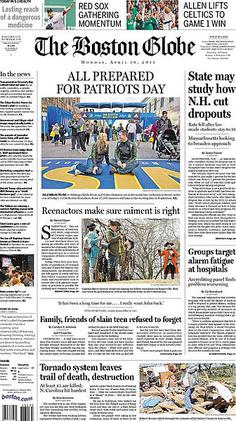
The Boston Globe, also known locally as the Globe, is an American daily newspaper founded and based in Boston, Massachusetts. The newspaper has won a total of 27 Pulitzer Prizes.

James Michael Curley was an American Democratic politician from Boston, Massachusetts. He served four terms as mayor of Boston from 1914 to 1955. Curley ran for mayor in every election for which he was legally qualified. He was twice convicted of criminal behavior and notably served time in prison during his last term as mayor. He also served a single term as governor of Massachusetts. He is remembered as one of the most colorful figures in Massachusetts politics.

James Augustine Healy was an American prelate of the Catholic Church. He was the first known African American to serve as a Catholic priest or bishop. With his predominantly European ancestry, Healy passed for a white man and identified as such.

The Boston Evening Transcript was a daily afternoon newspaper in Boston, Massachusetts, published for over a century from July 24, 1830, to April 30, 1941.
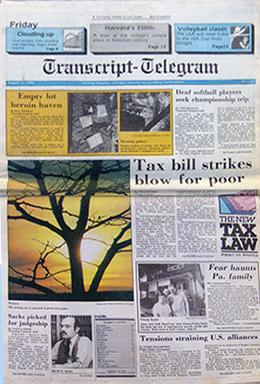
The Holyoke Transcript-Telegram, or T‑T, was an afternoon daily newspaper covering the city of Holyoke, Massachusetts, United States, and adjacent portions of Hampden County and Hampshire County.
Daniel William Cahill was a Roman Catholic preacher, lecturer, writer and educator in Ireland and the United States.
Events from the year 1901 in the United States.

The Pilot is the official newspaper of the Archdiocese of Boston and claims the title of "America's Oldest Catholic Newspaper", having been in continuous publication since its first issue on September 5, 1829. Although the first Catholic newspaper in the United States, The United States Catholic Miscellany of Charleston, South Carolina, was founded seven years earlier in 1822, it ceased publication in 1861.

Henry William Cleary was the sixth Roman Catholic Bishop of Auckland, from 1910 to 1929.
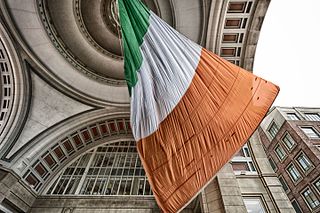
People of Irish descent form the largest single ethnic group in Massachusetts, and one of the largest in Boston. Once a Puritan stronghold, Boston changed dramatically in the 19th century with the arrival of immigrants from other parts of the world. The Irish dominated the first wave of newcomers during this period, especially following the Great Irish Famine. Their arrival transformed Boston from an Anglo-Saxon, Protestant city into one that has become progressively more diverse. These people hired Irish as workers and servants, but there was little social interaction. In the 1840s and 50s, the anti-Catholic, anti-immigrant Know Nothing movement targeted Irish Catholics in Boston. In the 1860s, many Irish immigrants fought for the Union in the American Civil War, and that display of patriotism helped to dispel much of the prejudice against them.
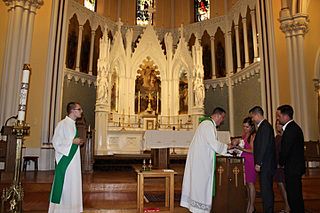
St. Mary of the Assumption Church is a parish of the Roman Catholic Church in Dedham, Massachusetts, in the Archdiocese of Boston.

The Bay State Banner is a weekly newspaper primarily geared toward the readership interests of the African-American community in Boston, Massachusetts. Distributed free of charge, it was founded in 1965 by Melvin B. Miller, who remained the chief editor and publisher until March 2023. In 2015, the publication celebrated its 50th anniversary serving the region's minority-oriented neighborhoods.
Irish American journalism includes newspapers, magazines, and the newer media, with coverage of the reporters, editors, commentators, producers and other key personnel.
The history of St. Mary's Church in Dedham, Massachusetts begins with the first mass said in Dedham, Massachusetts in 1843 and runs to the present day.
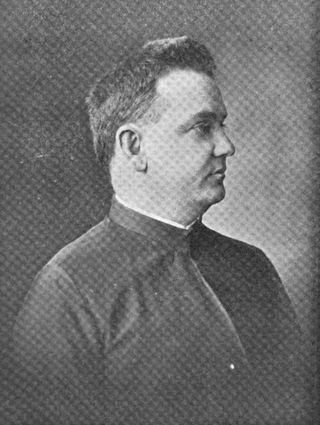
William George Read Mullan, SJ, was an American Jesuit and academic who served as President of Boston College from 1898 to 1903 and President of Loyola University Maryland from 1907 to 1908.
Patrick O'Beirne was an Irish-born priest who ministered in the Archdiocese of Boston.
The Daniel Slattery house was the site of the first Catholic mass in Dedham, Massachusetts.
Rev. Dennis J. O'Donovan was an American Roman Catholic priest.

James H. Reid, was a 19th-century American Maritime pilot. He is best known for being the dean of the Boston pilots, serving for 55 years. He was captain of the famous yacht America for 17 years when she was owned by Benjamin F. Butler. In 1897, he built a new America, named after the America's Cup defender.

George Newton Swallow was an American politician who served in the Massachusetts General Court and on the Massachusetts Governor's Council. He was the Republican nominee for Mayor of Boston in the 1903 Boston mayoral election













